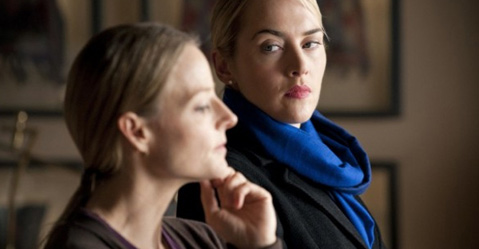Carnage
Christoph Waltz, Jodie Foster, Kate Winslet, and John C. Reilly star in a film written by Yasmina Reza and Roman Polanski, based on the stage play The God of Carnage by Reza, and directed by Polanski.

Working in close quarters, with limited a location and less than a handful of actors, is a challenge not for the weak of cinematic vision. No doubt, what makes the deliciously volatile and darkly funny Carnage soar is the Roman Polanski touch. Whatever we can say about the man and his misdeeds, Polanski can be a masterful filmmaker when he’s on his game and all the pieces are in place. Based on French playwright Yasmina Reza’s stage play The God of Carnage and reset in Brooklyn, this wickedly witty and unexpectedly relevant film brings to mind other Polanski films in which he skillfully marshaled dramatic intensity among “good people” in closed settings, from his early Knife in the Water to the potent allegory Death and the Maiden.
In this single-scene encounter in a Brooklyn apartment, Jodie Foster (who looks fit to ‘splode on numerous occasions) and John C. Reilly (a loveable everyman with a slow-brew dark side) are the aggrieved couple, whose son has been struck by the other couple’s son in a playground scuffle. We never meet the boys in question, except in long-shot scenes framing the film, but we learn plenty about them and their parents. The stick-wielding son’s parents are deftly played by Kate Winslet (a prim and cool figure, except when she isn’t) and distracted but smooth attorney Christoph Waltz, whose subtle performance, dancing slyly between civil and evil, reminds of his powerful work in Inglourious Basterds.
But the plot keeps thickening as other subjects sneak into the conversational back-and-forth. Over the course of the film’s 80-ish minutes in an alternately cozy and claustrophobic N.Y.C. apartment, things go bump and barf between passages of gliding social civility. Class and marital warfare bubbles up from the neat surfaces, as do larger questions of proper social behavior and the underlying barbarism of humanity.
In such an intense, close-up context, even innocent objects take on heightened talismanic power in the story, from a cobbler (and its pan) to a vase of tulips, an offending, umbilical cell phone, a Francis Bacon art book, and the lubricating fluid of single-malt scotch. As the two women calmly admire Bacon’s grittily elegant paintings in the pristine ambience of a well-kept apartment, they offer up glib appraisals of the art: “cruelty and splendor … chaos, balance.” The point is lost on nobody that these comments circle back to the very work of art we’re embroiled in. Polanski’s new baby is a prize.



